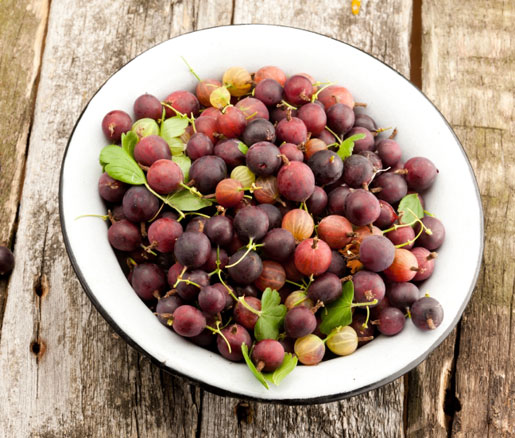
Ever eaten gooseberries? The slightly fuzzy, tart berries are very popular in traditional British cooking, but don't get a lot of press stateside. A cousin of the currant, gooseberries range in color from pale green to dark purplish-red, getting muskier as they ripen. They aren't quite sweet enough to eat out of hand, but they become jammy and bright when cooked down with a bit of sugar. Gooseberries are in season from May through August, but they're at their peak in July.
How to Store: Like most berries, gooseberries should be stored in the fridge unwashed for 2 to 5 days. Don't have time to make a batch of jam or curd right now? Freeze them. Just wash the berries, pat dry, and then place on a cookie sheet in the freezer. Transfer frozen berries to an airtight container and keep in the freezer for up to a year.
How to Cook: Remove the stem and tail of each berry before cooking. Gooseberries are delicious in a range of desserts, but the simplest way to cook them is to throw them into a saucepan with a handful of sugar and simmer. Mash the berries with a fork and let them gently bubble until the compote is thick enough to drizzle on ice cream or over your morning yogurt.
What to Make:
Gooseberry Fool [Epicurious]
Take that compote one step further by folding it into softly whipped heavy cream and crème fraîche. We like to sprinkle crumbled cookies on top.
Gooseberry and Sage Sauce [The Guardian]
Writer and UK food personality Hugh Fearnley-Whittingstall serves this fragrant sauce with roast pork or pork chops.
Gooseberry Meringue Tart [BBC Good Food]
Not sure what to do with a sour fruit? Treat it like another sour fruit. In this recipe, gooseberries are subbed for lemon in a gorgeous meringue tart.
Gooseberry Jam Donuts [Farmette]
What should you do with leftover gooseberry jam? Make these warm, puffy, sugar-dusted donuts, of course.




-57 web.jpg)


